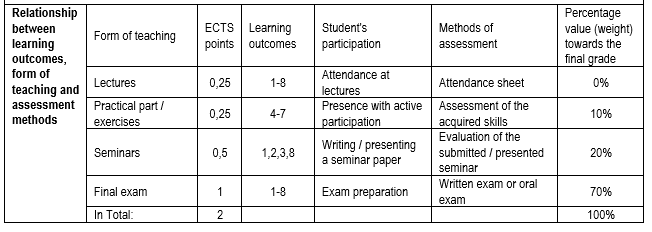Students will be presented with the fundamental principles, philosophies and organisation of palliative health care. Students will be qualified to assess needs; plan, conduct and evaluate health care in the last stage of life during a hospital stay, hospice or at home, as well as provide support to patient’s family during illness and grief.
Definitions and fundamental terms in palliative care. Principles and philosophies of palliative care. History of hospice and palliative care. Organisation of palliative care. Help with fulfilling basic human needs of dying patients. Procedures to solve and relieve from unpleasant symptoms and ease suffering of patient. Autonomy and dignity of patient. Relationship between nurse and patient. Communication with dying patient and their family. Support to patient’s family during illness and grief. Ethical questions in palliative care.
Obavezna literatura:
- Brkljačić M, Šamija M, Belev B, Strnad M, Čengić T. Palijativna medicina – Temeljna načela i organizacija; Klinički pristup terminalnom bolesniku; Medicinska etika. Rijeka: Markulin d.o.o. i Sveučilište u Rijeci, Zaklada onkologija; 2013.
- Mikšić Š. Palijativna zdravstvena njega (nastavni tekstovi), Preddiplomski studij sestrinstva, Osijek: 2018./19.
- Bijela knjiga o standardima i normativima za hospicijsku i palijativnu skrb u Europi. Preporuke Europskog udruženja za palijativnu skrb 2010.
- Strateški plan razvoja palijativne skrbi u Republici Hrvatskoj za razdoblje od 2014. do 2016. godine.
- Lughton J, Kindlen M. Palijativna njega – uloga sestrinstva. Edinburgh: Churchill Livingstone; 1999.
- Kadović M, Abou Aldan D, i sur. Sestrinske dijagnoze II. Zagreb: HKMS; 2013.
- Šepec S, Kurtović M, i sur. Sestrinske dijagnoze. Zagreb: HKMS; 2011.
- Vučevac V, Franinović MJ, Krznarić Ž, Braš M, Đorđević V. Uspostava sustava palijativne skrbi u Republici Hrvatskoj. Medix. 2016:22;119/120:78-81.
Dopunska literatura:
- Đorđević V, Braš M, Brajković L. Palijativna skrb: Mostovi nade i čovječnosti. Zagreb: Roketa; 2012.
- Đorđević V, Braš M, Brajković L. Osnove palijativne medicine. Zagreb: Medicinska naklada; 2013.
- Jušić A, i sur. Hospicij i palijativna skrb. Zagreb: Školska knjiga; 1995.
- Jušić A, i sur. Bioetika u teoriji i praksi. Zagreb: Nakladni zavod Globus; 2001.
- Havelka M, Despot Lučanin J. Komunikacija s teško bolesnim osobama i njihovim obiteljima. U: Despot Lučanin J. Komunikacijske vještine u zdravstvu. Jastrebarsko: Naklada Slap; 2010.
- Saunders C, Sykes N. Palijativna skrb u završnom stadiju maligne bolesti. Zagreb: Školska knjiga; 1996.
Upon completion of this course, students will be able to:
- argue the philosophy and principles of palliative health care;
- distinguish organizational forms and levels of palliative care;
- compare the basic features of palliative care in hospital, hospice, and community;
- carry out the nursing process, health care needs assessment, goal setting, plan development and implementation of procedures, evaluation;
- apply ethical principles and communication skills;
- apply procedures for resolving and alleviating the symptoms and suffering of patients;
- organize professional and social support for the patient and his family;
- comment on ethical issues in palliative care.



